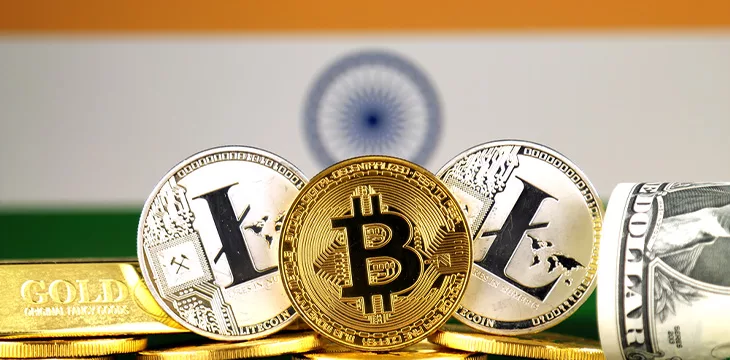|
Getting your Trinity Audio player ready...
|
Indian and global digital asset exchanges strive to improve users’ trading experience while complying with new regulatory demands, as the nation’s strong economic projections and commitment to emerging technologies lure investors and businesses.
CoinDCX, India’s first digital currency unicorn, has collaborated with Mesh to provide seamless connectivity between centralized exchange accounts and decentralized finance (DeFi) wallets directly within the CoinDCX platform, the company said in a statement. This integration is expected to eliminate complexities associated with digital asset deposits and offer users secure transactions.
“Solutions like Mesh streamline the complexities of the industry, significantly enhancing the usability factor for our platform,” Sumit Gupta, co-founder of CoinDCX, said to one news outlet.
At the same time, Bitget digital asset exchange has partnered with OnRamp Money, a digital currency payment solution provider, to enable Bitget users to buy and sell digital assets with the Indian Rupee using UPI and IMPS—the two popular money transfer solutions in India. The collaboration is expected to improve user interaction with digital currencies, enabling seamless conversion between fiat and digital currency instantaneously.
On the other hand, KuCoin digital asset exchange has become one of the first global exchanges to register with India’s Financial Intelligence Unit (FIU)—the nation’s anti-money laundering agency—as part of its effort to comply with local regulations.
“This milestone allows us to advance the conversation on crypto adoption in India, emphasizing user security and trading excellence. Additionally, it accelerates our investment and educational initiatives in India, aiming to stimulate industry growth and foster the blockchain landscape’s sustainable development,” Johnny Lyu, CEO of KuCoin, said in their official press release.
KuCoin revealed it will soon partner with local banks and fiat partners and introduce tailor-made payment solutions. The exchange said it is set to amplify its support for blockchain projects led by Indian entrepreneurs.
Other side
However, not all are in favor. Seychelles-headquartered OKX, the second-largest global digital asset exchange by trading volume, announced it no longer serves Indian users. The exchange has asked users to close all their margin positions and positions in perpetuals, futures, and options and withdraw funds from their accounts by April 30.
OKX’s decision came days after India blocked access to foreign digital asset exchanges like OKX, Binance, and Kucoin on the grounds of non-compliance. Apple (NASDAQ: AAPL)
pulled some foreign exchange apps from its App Store, while Google (NASDAQ: GOOGL)
delisted the trading platforms from its Play Store in India.
Last December, India’s FIU issued ‘compliance show cause’ orders to nine digital asset exchanges—Binance, Bitfinex, Bitstamp, Bittrex, Gate.io, Huobi (now HTX), Kraken, Kucoin
and Russia-based MEXC Global. The Indian government said these exchanges were operating illegally without complying with the provisions of the Prevention of Money Laundering Act.
The fastest-growing major economy imposes one of the harshest taxation on digital asset trading—a 30% flat tax on all digital asset income and a 1% tax deducted at source (TDS) on all digital asset trades above 10,000 Indian rupees (US$120). The South Asian nation also does not allow digital asset traders to offset losses against gains. In 2023, India introduced a penalty equal to TDS for non-deduction, interest of 15% annually for late payment, and even a jail term of up to six months.
“Crypto offers a pathway to financial empowerment for millions worldwide. India cannot miss out on this opportunity. Hence, all stake holders need to work together towards innovation & push for a fair taxation!” Sathvik Vishwanath, chief executive of digital asset exchange Unocoin, tweeted on X.
Blockchain adoption on the rise
While cautious about digital assets, the world’s most populous country has adopted blockchain technology for its central bank digital currency (CBDC) and other use cases.
According to ‘India’s Web3 Landscape 2023’ report, the country’s government and more than 50% of provincial governments are planning or running initiatives that leverage blockchain, the underlying technology of digital assets.
“The increasing adoption of web3 and blockchain across various sectors and industries is a big global opportunity for Indian tech talent and businesses. Blockchains have enabled various innovative use cases such as DeFi, Real World Assets tokenisation, Self-Sovereign Identities, Track & Trace etc., which were not possible earlier,” Krishna Tyagi, head of Web3 at KPMG in India, stated in the report.
In other news, decentralized blockchain technology unicorn Zyber 365 recently signed a pact with billionaire Ratan Tata-backed startup CashKaro, a leading cashback company. Zyber 365 Group is founded by Pearl Kapur, India’s youngest billionaire. The partnership is expected to reshape cashback services in India using blockchain technology.
Watch: India is going to be the frontrunner in digitalization

 07-06-2025
07-06-2025 





